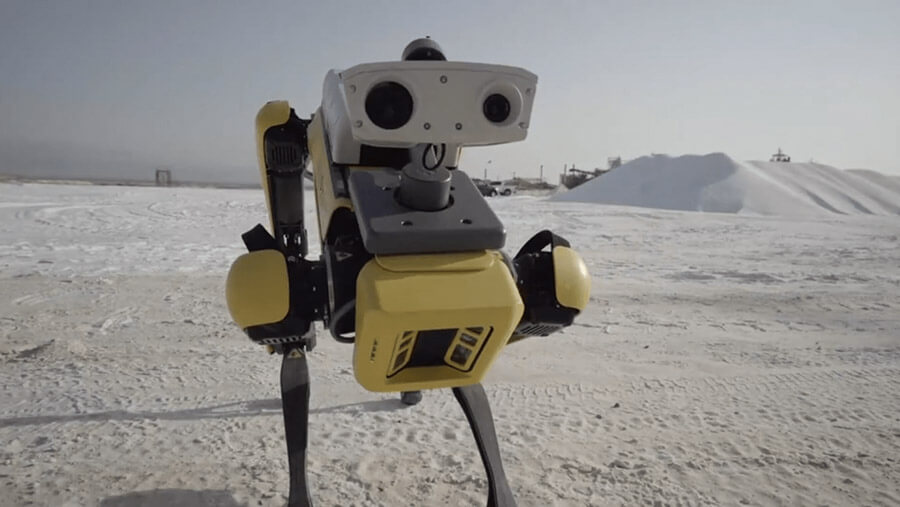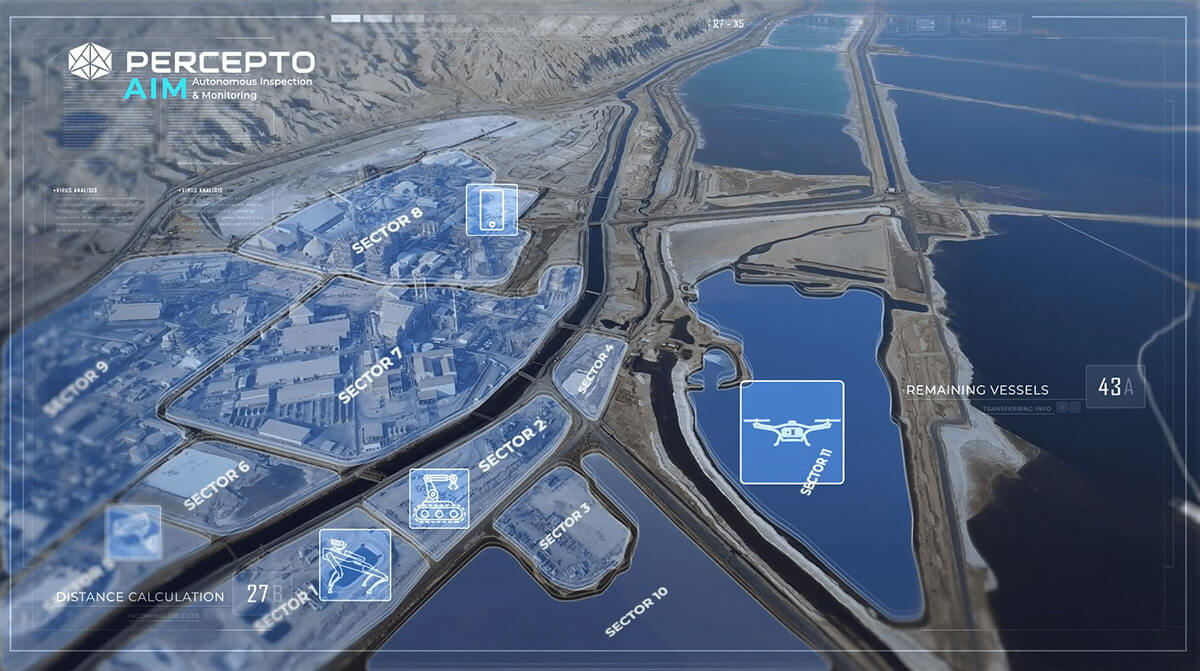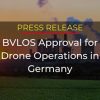Our recently-launched AIM platform redefines the role of autonomous robotics in large-scale industrial sites. AIM is the world’s first end-to-end autonomous inspection robotics platform – orchestrating efficient visual data capture and then applying AI-powered analysis to deliver actionable insights.
AIM helps site operators detect risks earlier, enhance measurement accuracy, spot trends faster and achieve better situational awareness. And it does all this through persistent and consistent autonomous high-quality visual data collection, automated data upload, and near real-time data sifting, analysis and reporting.
What did it take to make AIM? What are the breakthroughs that allow us to deliver value from capture to insights? In this post, we’ll peek under the hood and see how we went about changing the face of autonomous industrial robotics.
The AIM ecosystem redefines autonomy
The idea of an autonomous industrial robot isn’t new. So what makes robots in the Percepto AIM ecosystem different?

The defining feature of Percepto AIM autonomous robots is their ability to accomplish multiple missions over time with no human intervention whatsoever. This may sound obvious, yet there are many “automated” robots that need constant human assistance – when they run out of power mid-mission, or get caught in inclement weather, or get stuck behind obstacles or lost in new site areas.
We designed AIM robots to replicate all the things human robot operators do – and may not even realize they’re doing – allowing a truly autonomous operations cycle.
For example, AIM robots monitor their battery level, alongside their mission objectives – predictively managing their power levels. This ensures that they always have enough power to return for charging during or after each mission – and don’t either get stuck mid-mission (in the case of ground robots) or drop dangerously from the sky (in the case of drones).
Once docked, AIM robots conduct self-checks and self-maintenance, as well as recharging between missions. They stow themselves safely to both protect themselves from weather and (uniquely) to optimize their battery lifetime through precise climate control of the battery compartment.
When on a mission, AIM robots are designed to react dynamically to changing environmental conditions in real time. For example, if weather data indicates wind, AIM robots adjust their mission parameters to compensate for fluctuating wind speeds (which affect propulsion and power consumption) – while still ensuring mission integrity. If conditions deteriorate during the mission, the robot may decide to cancel the mission and return to safe storage. And if light conditions don’t allow for effective imaging, the system can decide to reschedule the mission, or approach the object more closely.
Another facet of human-free autonomous industrial robotics AIM addresses is safety. We built in numerous and redundant safety systems and functionality to ensure maximum operational performance with minimal risk. For example, Percepto Sparrow drones have a unique built-in parachute to avoid injury to others or damage to equipment (and itself) in the unlikely event of catastrophic failure. AIM robots use advanced computer vision capabilities to safely and effectively respond to changing conditions by holding in place or landing in place.
Finally, much like humans, AIM autonomous robots are self-critical. They can detect when an on-board sensor may be malfunctioning or reporting incorrect data by corroborating and extrapolating data from other sensors or sources.
AIM is the next generation of autonomous robotic platforms. AIM receives requests for specific insights or information from remote users, and determines the most efficient and transparent way to deliver the requested insights. AIM users request and receive data and insights – the autonomous collection of this data, driven by our advanced robotics, and the generation of these insights, driven by cloud-based AI-powered analytics, is the means to this end
Data streams: The secret AIM sauce
Visual data analytics solutions are a known quantity. But AIM is a different breed altogether.

With AIM, as mentioned above, data collection is a means to an end. Our autonomous robots are the means of data collection – whereas petabytes of data collected are the means to insights. And AIM was designed to distill and deliver actionable insights and to be robotics-agnostic. It’s a software platform that integrates and maximizes the value of robotics platforms (including our own) by making them fully autonomous and able to fulfill real-world use cases.
Mainstream data management systems analyze ad hoc mission data, and don’t know which analytics to run on which data to get the right insight. AIM leverages both ongoing and historical data collection, to better detect anomalies, identify trends and focus stakeholder attention. Our continuous monitoring and data feed means that AIM is familiar with site assets. This enables the system’s AI-powered analytics to derive insights from repetitiveness – detecting changes over time.
Because AIM is a data-centric solution, our data lake is structured and managed differently, too. Each data piece is categorized and cataloged for easy query and fetching. Change detection algorithms identify “interesting” pieces of data – sifting out what really matters.
When users interact with AIM, they refer to actual site assets – not random system groupings or categories like geographical location or asset shape. Thus, site assets are labeled with clear, customizable tags such as ‘Oil Tank #12.’ This makes defining AIM missions, and understanding AIM insights and reports, simpler for non-technical users and decision-makers.
Finally, AIM is a self-learning system. Thanks to a continuous data feedback loop that comprises data collection, analysis and reporting – AIM builds models over time that continuously improve themselves. The system actually deepens its understanding using machine learning and model confidence metrics, delivering better insights the longer it operates.
The Bottom Line
AIM is a game changer – a new category in the market. It’s the first and most robust platform to offer a viable substitute for human oversight of operations in dangerous, inaccessible, or remote locations. AI-powered, truly autonomous, multi-platform, and powered by integrated robotics – AIM delivers data-driven and real-time insights based on 360-degree situational awareness. Basically, we took a long, hard look at “autonomous” industrial robotics, and decided to AIM higher.





